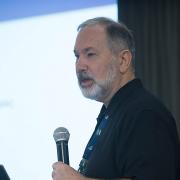Presentations

Kick off your journey to becoming a DevOps master by learning Kubernetes through a series of hands-on examples. Get started with an introduction to distributed systems and the architecture behind Kubernetes, then learn about Kubernetes APIs and API object primitives. By the end of this workshop you’ll be deploying, scaling, and automating container-based solutions using open source tools for distributed computing.

A crash course to get you up and running with PostgreSQL. We will cover:
- Installation from binaries and source
- Debug builds and basic debug workflow
- Cluster initialization, startup, and session managment
- Basic configuration - postgresql.conf and pg_hba.conf
- psql use/hints
- SQL syntax and quoting
- Data types
- DDL
- DML
- Queries: including Joins, Subqueries, VIEWs, Common Table Expressions

Linch-Pin is a hybrid cloud provisioner, written in Ansible which provides tooling for provisioning any cloud provider, including multiple clouds at the same time.
This presentation will cover the basic provisioning process in Linch-Pin. The inventory generation will also be covered, as this is very useful when configuring the provisioned nodes.
Linch-Pin currently supports Openstack and Rackspace, Google Cloud Engine, Amazon EC2, Libvirt, Beaker, Duffy (CentOS CI Provisioner). More coming soon.
The Reproducible Builds project creates infrastructure and fixes upstream code so that binaries can be independently verified as the result of compiling source code. Without verifying the connection between source code and binary software, toolchains become a tempting target to inject exploits.
This talk will demonstrate why reproducibility matters, common issues and fixes, and tools used to identify and troubleshoot issues, moving towards reproducibility as a set of best practices when developing and improving software.

Introduction to SoC+FPGA, a chip combining a CPU and an FPGA in a single package. Talk starts with an explanation of what the SoC+FPGA is, it's capabilities, and available offerings from vendors. In-depth dive into the software support follows, covering both RTOSes for small chips as well as mainline U-Boot and mainline Linux for larger solutions, finished by a look into the recent developments in Linux, covering FPGA manager and DeviceTree Overlays.

The Universal Serial Bus (USB) has become the defacto standard for wired communication between small devices and PC's. The attributes of USB which make it the most useful however, also make it complex. This presentation will cover the fundamentals of USB and will show the basics of creating a USB device using the open source M-Stack library on a PIC32 microcontroller. This presentation will also show the libusb library, used for accessing USB devices from user space in Linux and other OS's. USB
device classes and the appropriate ways to use them will also be discussed.

The IoT world is here, and it isn't just Arduinos and Pis. There are still several families of mature microcontroller architectures in wide use, and there are also significant differences and limitations to be aware of, including things like speed, power consumption, and stack size. They also span a range of cost and complexity, as well as software support, both open source and vendor-specific. Yes, this talk provides an overview of the landscape, but focuses mainly on several specific hands-on examples of how to build, flash, and debug a modern embedded microcontroller-based device.

At scale, easy things become hard. Database migrations for web applications are particularly perilous when performed under heavy load. Join us as we discuss migration strategies for non-downtime deployments. We'll cover the fundamentals of Postgres locking and how it can crash your app. We'll see how and when to run migrations to avoid locking so they don't require downtime and what kind of tooling can help you. Regardless of the scale you run at, you'll learn plenty of useful information about Postgres, locking, and how to avoid catastrophe the next time you deploy.

How to get the most performance from the JDBC Driver. Recent enhancements to the driver have improved the performance dramatically. Learn how to get exploit these performance features from the expert

JSON Web Tokens, or JWTs (pronounced "jots") are an "open, industry standard RFC 7519 method for representing claims securely between two parties" -- but what does that actually *mean*? If you decode the buzzwords, you'll find JWTs solve common problems around authorization for web and mobile apps in a portable, easily implementable fashion -- and you're going to want to use them *everywhere*.


